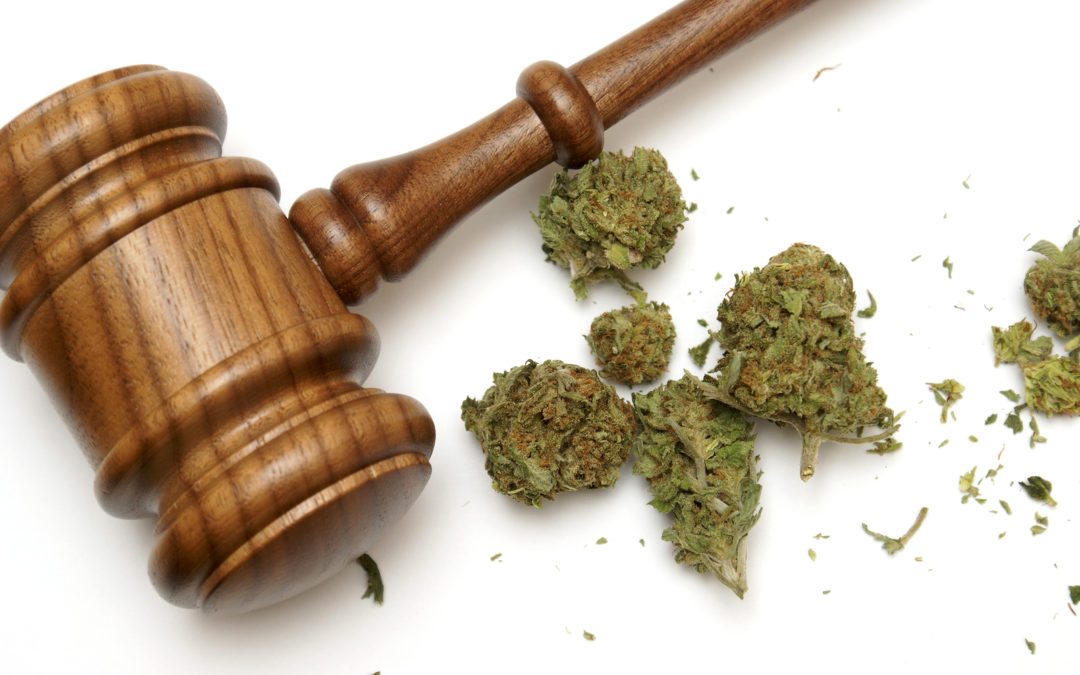Once legally and socially unthinkable, medical marijuana is slowly but surely become more acceptable in the United States thanks to an ever-mounting body of positive scientific evidence. As of September 2016, half the states in the country and Washington D.C. have implemented medical Cannabis programs, with new laws and court rulings in favor of medical marijuana emerging all the time. Unfortunately, while legislation is making great strides, the intersection of Cannabis and employment remains fraught with legal peril for employees – even in states where medical marijuana is legal. In this article, we’ll discuss whether your employer can fire you for possessing or testing positive for marijuana, and go over the limitations on your rights as a medical marijuana patient.
Can Registered Patients Use Medical Marijuana at Work or School in MA?

Let me start by emphasizing that you should talk to an attorney if you need legal advice regarding a wrongful termination or other matter relating to employment law. This article is not legal advice and is not intended to serve such a purpose. With that caveat in mind, let’s examine current state and federal laws about where and when registered Cannabis patients in Massachusetts can use their medicine lawfully.
Recreational and medical marijuana are both illegal under federal law. In fact, the Drug Enforcement Administration (DEA) classifies Cannabis as a “Schedule I” substance – the most serious rating a controlled substance can receive. (Heroin, for example, receives the same designation.) Despite repeated calls to reschedule marijuana, the DEA has remained steadfast in its opposition to relaxing the federal designation of Cannabis. In fact, the DEA refused to reschedule marijuana as recently as August 2016, much to the detriment of patients who are effectively at the mercy of profit-oriented medical marijuana dispensaries.
Since Cannabis is strictly prohibited by federal law, medical marijuana regulations necessarily fall to each individual state. Laws about medical marijuana in Massachusetts are consolidated in Chapter 369 of the Acts of 2012, otherwise known as the Act for the Humanitarian Medical Use of Marijuana.
Despite covering other subjects in detail, the Act has surprisingly little to say about medical marijuana as it pertains to employment, instead focusing mainly upon the regulations that govern certification and registration regulations. There is, however, one important provision that touches on the use of Cannabis in public settings.
This provision is located under Section 7 of the Act, which broadly deals with “Limitations of Law,” such as operating vehicles while under the influence of marijuana (which, by the way, can get you arrested for DUI). It discusses whether it’s legal to use medical Cannabis at work in Massachusetts, and states the following:
“Nothing in this law requires any accommodation of any on-site medical use of marijuana in any place of employment, school bus or on school grounds, in any youth center, in any correctional facility, or of smoking medical marijuana in any public place.”
Put simply: no public use allowed. Medical marijuana may be legal in Massachusetts, but that doesn’t mean registered patients are entitled to smoke (or otherwise use) marijuana on the job. Likewise, students who are registered patients are prohibited from using medical Cannabis while at school. Even though possession of a 60-day supply is legal for registered patients who have a valid Massachusetts medical marijuana card, you can still receive a fine for using marijuana in public, which the Act does not permit.
However, fines aren’t the only potential penalty for using Cannabis at work. Depending on your employer, you could even risk losing your job.
Your Expectation of Privacy in the Workplace: Drug Testing and Wrongful Termination
While the Act does not explicitly mention drug testing, it does contain a few provisions which have some bearing on the topic. To be more specific, Sections 7(F) and 7(G) clearly defer to federal law, stating respectively:
“Nothing in this law requires the violation of federal law or purports to give immunity under federal law.”
“Nothing in this law poses an obstacle to federal enforcement of federal law.”
In 2013, the Department of Justice instructed the DEA to deprioritize prosecution related to the personal possession of medical marijuana as long as it fell within the bounds of state law, and to instead focus on the investigation of more pressing legal issues such as trafficking, illegal cultivation operations, intoxicated driving, and suspected links to organized crime. Likewise, state and local police officers have been instructed not to arrest registered patients who possess an ID, assuming they do not have more medical marijuana than is currently allowed by state law.
However, even if you don’t get criminally charged, many employers remain opposed to the use of recreational or medical marijuana. The question is, what is an employer’s right to fire an employee under state or federal law?
Under Massachusetts law, M.G.L.c.214 § 1B provides that a “person shall have a right against unreasonable, substantial or serious interference with his privacy.” Citing M.G.L.c.214 §1B, employers’ group Associated Industries of Massachusetts (AIM) notes the following in the 2016 edition of its reference guide to state and federal employment laws:
“Massachusetts courts have held that this law must balance the employer’s legitimate business concerns against the employee’s reasonable expectation of privacy in the workplace… In the cases of drug testing, searching, and surveillance, the expectation of privacy may be eliminated through well communicated policies explaining that the employer will, or reserves the right to, conduct these actions.”
In other words, an employee’s normal expectation of privacy is diminished due to the public nature of a workplace — particularly in cases where the employer clearly warns the employee, whether through policy handbooks, email messages, or other forms of communication, that drug testing will be taking place. If an employee’s use of marijuana, even for medical purposes, could result in financial harm to the employer, the employer generally has the right to protect its financial interests by terminating the employee.
Moreover, it’s important to note that numerous businesses can – and have – fired employees and rejected job applicants for simply testing positive. In other words, even prior Cannabis use can get you into trouble with a current or prospective employer, even if you’ve never come to work while remotely intoxicated. Courts have repeatedly ruled in favor of these employers, even in states with relaxed marijuana laws like Colorado, whose Supreme Court recently ruled in favor of Dish Network, which fired employee Brandon Coats – who is paralyzed and suffers from muscle spasms due to a car accident – after he tested positive for marijuana use. Coats did not use Cannabis while at work.
In Webster v. Motorola (1994), the Massachusetts Supreme Court ruled that the legitimacy of randomized drug tests must be evaluated on a case-by-case basis. For example, in one case, the Court determined a drug test involving a professional editor was inappropriate, because the employee’s job did not have bearing on public health, public safety, or national security. However, in another case, the Court ruled in favor of the employer because the employee’s job involving driving thousands of miles every year. In the latter instance, public safety was a valid issue because driving while under the influence of marijuana may be risky, like driving under the influence of alcohol, creating a potential issue of liability for the company should an accident have occurred.
Here is a direct quote from the Massachusetts Bar Association on the subject of workplace drug testing and medical marijuana:
“[Various] courts have found that because federal law preempts state medical marijuana laws, medical marijuana users authorized under state law are not protected from employer drug testing policies… [B]ased on current case law in other states at this time, employers can continue to include marijuana in their drug testing. While Massachusetts employers will likely be able to decline to hire an applicant or discharge or discipline an employee for a positive test for marijuana use, even if for authorized medical reasons outside of the workplace and not on work time, nothing is guaranteed at this time.”
In 2015, Massachusetts resident Cristina Barbuto went to court (see Barbuto v. Advantage Sales and Marketing, LLC) after she was fired for using medical marijuana for Crohn’s disease, a serious digestive disorder, in her own home. Barbuto sought “unspecified damages [above $75,000] for lost wages, lost benefits, liquidated damages, attorneys’ fees, emotional distress, reputational harm, and damage to her future career,” but after being remanded (move) the case was ultimately dismissed by a Suffolk Superior Court judge. In fact, the court specifically dismissed Barbuto’s claim that her termination constituted a violation of the Act for the Humanitarian Medical Use of Marijuana, which, as I was just discussing, does not contain any special provisions protecting employees from being fired for Cannabis use.
For better or worse, private companies can hire and fire employees for just about any reason that falls within the bounds of the law. Title VII of the Civil Rights Act of 1964, a cornerstone of employment law, applies to companies with 15 or more employees and prohibits termination only upon the basis of race, color, religion, sex and national origin. It has nothing to do with medication.
Drug Use Policies for Government Workers, Drivers, and Pilots

The nature of a profession or industry can also impact an employer’s likelihood of firing an employee due to medical Cannabis use. For example, government workers are generally held to stricter standards than people in the private sector. Medical marijuana is legal in Washington D.C., but not if you work for the government.
People who work in transportation-related professions also have a high risk of termination, simply because driving or operating heavy machinery while intoxicated by marijuana is extremely unsafe. Can you imagine keeping your job as a bus driver, truck driver, airline pilot, or forklift operator after you were caught drinking at work? The same applies to using marijuana at work. Even though Cannabis has perfectly legitimate medical purposes, it can still delay your reactions and slow down your decision-making processes, just like alcohol or any prescription medication that causes drowsiness.
Remember, employers are frequently held liable — and ordered to pay huge sums — for the negligent or reckless actions of their employees. If you intentionally engage in risky actions, or simply fail to take adequate precautions against a foreseeable accident, your employer could fire you because you are a financial liability to the company.
You should always err on the side of caution, and should never drive or operate dangerous equipment while using your medication. By using medical marijuana at work, you risk losing your job — and worse, causing a serious accident.
Talk to a Doctor About Qualifying for Medical Marijuana in Boston
Ultimately, employee rights are one of the greyest areas of an already grey legal issue. That being said, disability discrimination against employees on the basis of a medical condition is strictly prohibited by the Americans with Disabilities Act (ADA), among other state and federal laws. The best course of action is to refrain from bringing your medical marijuana to work — and if you’re really concerned, to contact a lawyer.
Medical marijuana has helped countless patients manage their symptoms and enjoy a greater degree of physical comfort in their everyday lives. If you’re living with chronic pain, chronic insomnia, cancer, arthritis, anxiety, ALS, depression, MS, glaucoma, HIV/AIDS, or are undergoing chemotherapy, medical Cannabis could be right for you. Call Inhale MD at (617) 477-8886 to start discussing whether you could benefit from medical marijuana in a confidential consultation.

